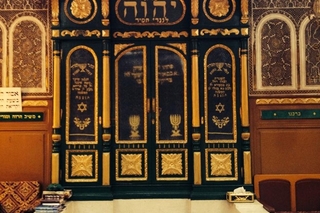Location: Miller Hall
406 Prospect Street
New Haven, CT 06511
Admission: Free, registration required
Open to: General Public
Event description:
Please join us for a day-long symposium on Jewish music-making in Muslim lands, culminating in a concert in Marquand Chapel on the Matrouz material of North Africa with singer Laura Elkeslassy. In this symposium, facilitated by ISM Fellow Ilana Webster-Kogen and Vanessa Paloma Elbaz, scholars from around the world consider the diverse forms of Jewish-Muslim artistic interventions that have animated life in the Arab world, al-Andalus and the Ottoman Empire. Recognizing the moments of joy and pain that have punctuated personal relationships and political networks, our contributing speakers celebrate the (predominantly) Arabic-language musical styles that emerge from religious ritual and that create fora for exchange and collaboration. Scholars from musicology, ethnomusicology, sound studies, Jewish Studies, and Middle East Studies, poets and translators, musicians and practitioners speak about the ways that everyday encounters facilitate musical collaboration, and the impact Jewish migration has on memories of intimacy.
Co-sponsored by Yale Institute of Sacred Music and Jewish Music Institute.
This event is free and open to the public. Lunch will be provided for the symposium. No registration is required for the concert with Laura Elkeslassy.
Schedule:
- 12-5: Symposium (Miller Hall)
- 6-7: Concert (Marquand Chapel)
Contact: Katya Vetrov katya.vetrov@yale.edu
